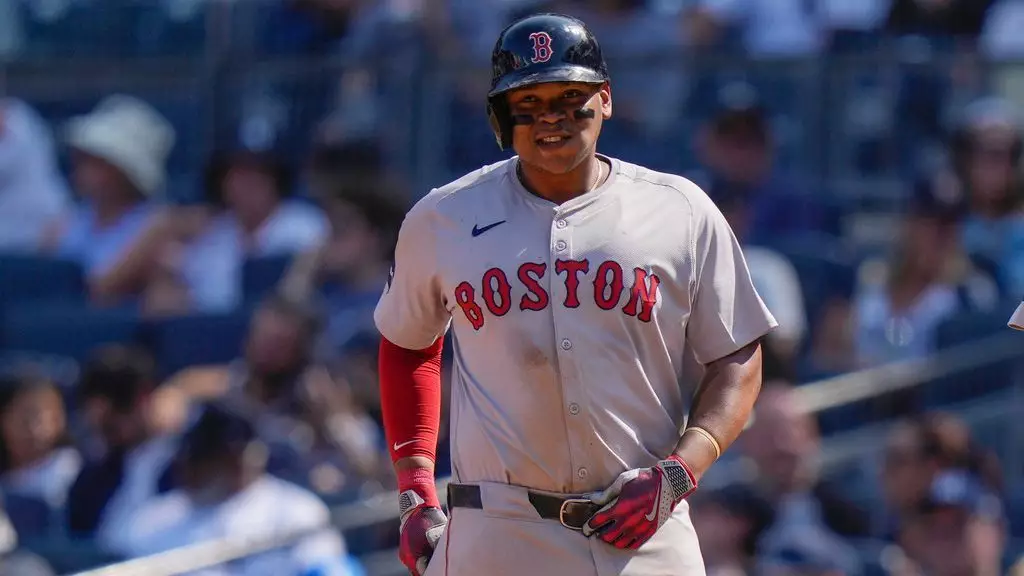In the complex tapestry of Major League Baseball, few players find themselves as central to a team’s identity as Rafael Devers is to the Boston Red Sox. Recently, Devers made headlines not just for his performance on the field, including a impressive home run that solidified a win against the Texas Rangers, but for his unequivocal stance on his role as the team’s designated hitter. This steadfastness deserves attention, as it reflects not only the player’s self-awareness but also an emerging trend in the game where athletes are increasingly vocal about their positions and responsibilities.
When Devers spoke candidly with reporters about the prospect of taking on first base in the absence of Triston Casas, who is sidelined for the season due to a knee injury, it was evident that he is not one to bow to internal pressure. The Red Sox management had hoped to leverage Devers’ diverse skill set by suggesting a temporary position switch. However, Devers’ response was clear: he sees himself strictly as a DH and is not interested in navigating yet another transition on the field.
The Costs of Position Changes
The Red Sox’s decision to sign Alex Bregman, a prominent third baseman, forced Devers into the designated hitter role earlier in the season. From this, a narrative emerges about the complications of positional flexibility in baseball. Devers noted, “They can’t expect me to play every single position out there,” and rightly so. His unwillingness to shuffle positions underscores a vital truth: constantly switching roles can affect not only one’s performance but can also undermine a player’s confidence and signature playing style. In a sport that requires precision and routine, the clarity of a designated role can be an asset, not a liability.
Devers elaborated on his conversation with Craig Breslow, the Red Sox chief baseball officer, indicating that Breslow, a former player himself, should appreciate the nuanced difficulties of changing positions. His candid expression of dissatisfaction implies that the organization ought to respect the commitments it makes to its talent. Devers worries that a call to play first base could lead to further expectations to fill in wherever the team sees fit. “Next thing you know, someone in the outfield gets hurt and they want me to play in the outfield,” he explained, a scenario that reflects not just his particular case but a larger issue of player safety and role assignment in the league.
The Player-Management Dynamic
At its core, Devers’ criticism sheds light on the delicate balance between player autonomy and team strategy. While it’s common for management teams to seek versatile athletes for the sake of roster flexibility, it is equally important to honor the individual’s preferences and skill sets. Devers articulates a key point in modern sports culture: players are increasingly unwilling to compromise their roles for what may be seen as short-term solutions to team problems. Athletes today are acutely aware of the toll position changes can take, both mentally and physically.
Additionally, the suggestion that Devers might step into a role with zero experience creates an unsettling precedent. Why should a player jeopardize their established success by venturing into unfamiliar territory? Devers’ insistence on remaining at DH is not merely a defensive posture; it reflects a well-considered approach to maximizing his impact. With a skill set perfectly tailored for the role, he provides the Red Sox with a strong offensive presence, and to dilute that value by shifting him around could lead to dire consequences.
The Bigger Picture of Player Identity
Ultimately, Rafael Devers’ insistence on maintaining his designated hitter role symbolizes a broader discourse about player identity in the game of baseball. Athletes are eager to establish their legacies while navigating the pressures imposed by internal management decisions. Devers’ refusal to change positions speaks to the importance of stability in a sport characterized by its own unpredictability. As fans and analysts watch this narrative unfold, it serves as an important reminder that the game’s enduring nature rests not just on statistics, but on the voices of those who play it. This story mirrors many athletes’ desire to define their paths without the fear of constant reinvention at the behest of team dynamics.


Leave a Reply